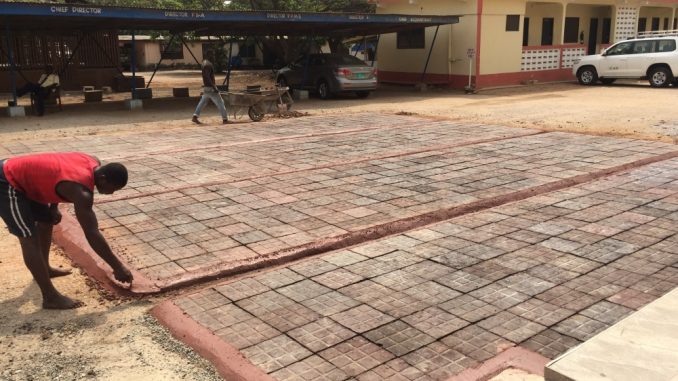
A Ghanaian has introduced into the country, an innovation in the construction industry that is set to help Ghana solve its plastic waste menace and create jobs for hundreds unemployed youth.
In the last six months, Nelson Boateng, a factory hand, has been recycling plastic waste products, which are developed into pavement blocks.
Using 80 per cent of broken plastic products and 20 per cent of sand, he is able to produce 12-inch square pavement blocks that have a lifespan of 500 years.
With a current production capacity of 200 blocks per day, a total of 230 direct and indirect jobs have already been created by Nelson.
He told TV3 these figures could increase with the availability of a hydraulic pressing machine.
“There is ready market for the product, but because we are not doing this on a large scale, I don’t want to put myself in a position where I will not be able to provide for their demands,” he indicated.
Beyond its durability, the pavement block made with this innovation makes the product cheaper and far better than the normal pavement blocks on the market.
With Ghana struggling to properly manage plastic waste, the innovation being championed by Nelson is being lauded by industry players who say it is imperative for the government to capitalize on it to help reduce the rate of unemployment in the country.
In West Africa, Ghana in particular, the issue of collection, management and disposal of plastic waste continues to be a burden for governments as one of the biggest sanitation problems.
It is estimated that only two per cent of the about 22,000 tonnes of plastic waste generated annually in Ghana are recycled, with the remaining 98 per cent finding its way to landfill sites, drains, water bodies and other open places, including the streets.
The lack of political will has made it difficult for Ghana to make a definite decision as to whether to ban the use of plastics as a means of solving the country’s sanitation problems.
Minister of Environment, Science, Technology and Innovation, Professor Kwabena Frimpong-Boateng has however, pledged government’s support to enable Nelson expand the production to other parts of the country and employ more youth.
“We are going to provide him with that hydraulic machine so that he can scale up and I hope that we can replicate this project in all municipalities and districts,” Professor Frimpong-Boateng said.
By Rising Africa
Source

I am interested.How can i meet you.